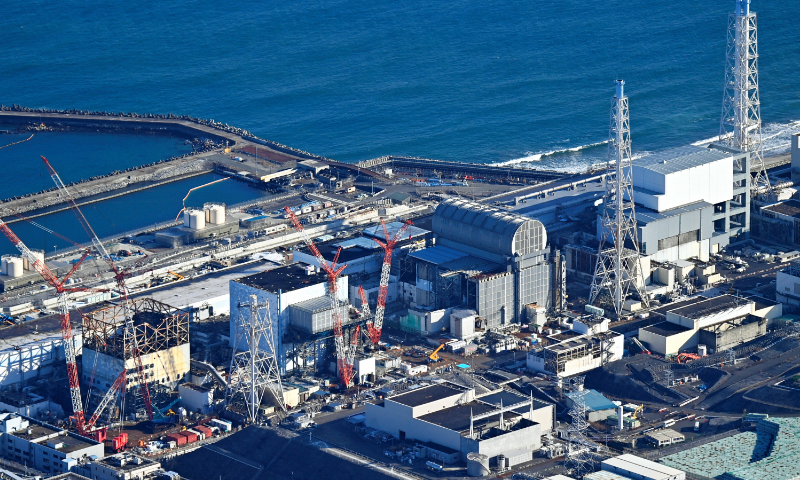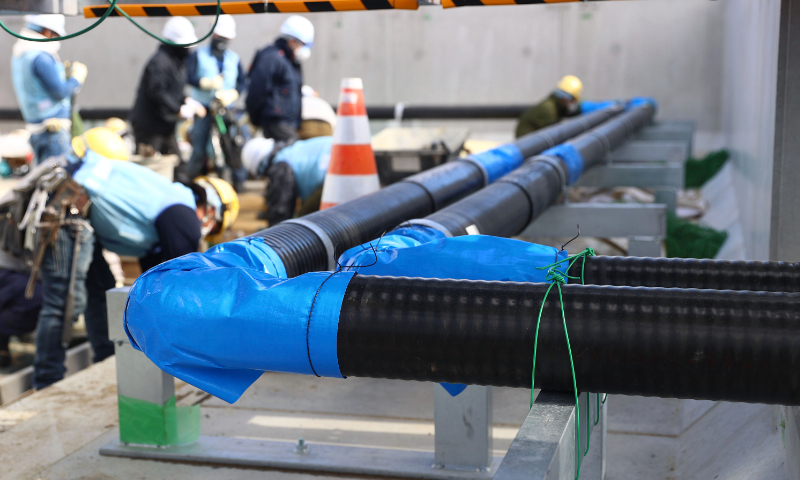
Aerial photo shows the damaged reactors at Fukushima Daiichi nuclear power plant on January 19, 2023, in Fukushima, Japan. Photo: VCG
Editor's Note:Days after the 12th anniversary of the Fukushima nuclear disaster, Japan began making preparations for the dumping of nuclear-contaminated wastewater from the Fukushima Daiichi nuclear power plant.
Despite strong internal and international opposition, Japan still intends to dump more than 1 million tons of irradiated water into the Pacific Ocean in the spring or summer of this year, the Japanese government confirmed in January.
This is the second of three installments by the Global Times to examine the expected tremendous economic impacts of the Japanese government's reckless decision, including huge damages to its nuclear industry, its agricultural exports, as well as the fishery industry in Pacific countries.
See the first installment here.

Tokyo Electric Power Co. (TEPCO) is building a facility for treated water of the crippled Fukushima No. 1 nuclear power plant in Futaba town, Fukushima Prefecture on January 31, 2023. Photo: VCG
Japan recently began preparing for the dumping of nuclear-contaminated wastewater into the ocean scheduled for the spring of 2023, which has sparked global concerns over food safety. Insiders noted that such an action would further tarnish the already negative image of Japanese food exports and, at the same time, have a long-lasting impact on the fishing industry in neighboring and Pacific countries.
Japanese agricultural product exports to China have seen a steady decline over the last decade after the Fukushima nuclear accident in 2011. Analysts said that although Japan has never been a key source of agricultural product imports for China, a further decline in demand is likely resulting from Japan's intended plan to dump nuclear-contaminated wastewater in the Pacific Ocean.
China's agricultural imports from Japan accounted for less than 1 percent of its total agricultural imports in 2022, according to statistics from industry associations.
Import restrictionsCurrently, import restrictions on agricultural products from certain areas of Japan remain in many parts of the world.
Soon after the nuclear disaster, 55 countries banned food imports from Fukushima and neighboring prefectures, but the US ended restrictions in 2021, followed by some other countries and regions, reducing the number of closed markets to 13, including China and South Korea, according to a June 2022 report by the Asia-Pacific Journal.
Imports of foodstuffs, agricultural products, and feed from 12 prefectures in Japan, including Fukushima, Gunma, Tochigi, Ibaraki, Miyagi, Yamagata, Niigata, Nagano, Yamanashi, Saitama, Tokyo, and Chiba, have been banned in China since April 2011, according to a notice released in 2011 by the General Administration of Customs.
To be approved for importation, edible agricultural products and feed produced in other parts of Japan must first receive an inspection certificate of qualified radioactive substances and a certificate of origin issued by the Japanese government should be provided when applying for inspection. Chinese local inspection and quarantine institutions then test imported foodstuffs, edible agricultural products, and feed for radioactive substances. Only those that pass the test are allowed to be imported, read the notice.
"As far as we know, food imports from Japan that have entered the Chinese market have all passed quality assurance tests at the customs. There is strict supervision and all importers must be declared and commodities be imported in strict accordance with the regulations," an industry insider from a food association in China, who spoke on condition of anonymity, told the Global Times on Sunday.
The insider noted that the impact on imports has been seen for years now, especially in the catering industry. What concerns global consumers now is not only the nuclear contamination of imported food from Japan, but the contamination of domestic food spread through the ocean.
"Unlike ordinary industrial wastewater, radioactive waste has a half-life of decades, or even hundreds of years, even when diluted in the ocean. This means that nuclear contamination cannot easily be dispersed, and marine life could be contaminated with radiation. When plants and animals are exposed to radiation, many will mutate," said the insider.
Canada has detected cesium-134 in salmon on its west coast, suggesting contamination from Japan's Fukushima nuclear disaster has spread to North America, the insider stressed.
Negative sentiments The insider also revealed that China's current biggest Japanese agricultural product imports are processed foods and beverages, such as biscuits, chocolate, and alcoholic beverages. In other words, non-perishable goods.
Japan's central and prefectural governments have been trying to clean up the image of Fukushima-produced food, but negative sentiments persist at home and abroad.
"Our customers kept on asking us if our salmon and tuna come from Japan. And we repeat again and again that our sashimi (raw fish meat) products are imported from Norway, New Zealand, and other countries except Japan, although we are a Japanese-style restaurant," a general manager surnamed Zhao at a Japanese food restaurant based in Beijing's Fangshan district, told the Global Times on Friday.
The manager said that Chinese customs only allows fresh and frozen food that has been tested for quality assurance to enter the market. But Chinese consumers have lost all faith in Japanese-produced seafood.
The insider from the food association suggested that China should strengthen trade and the importation of agricultural products and foodstuffs from countries such as Laos, Myanmar, and Thailand, which are more distinctive, of better quality, and less polluting compared with Japanese agricultural products.
The China-Laos Railway provided these Southeast Asian countries greater access to the Chinese market, the insider noted.





